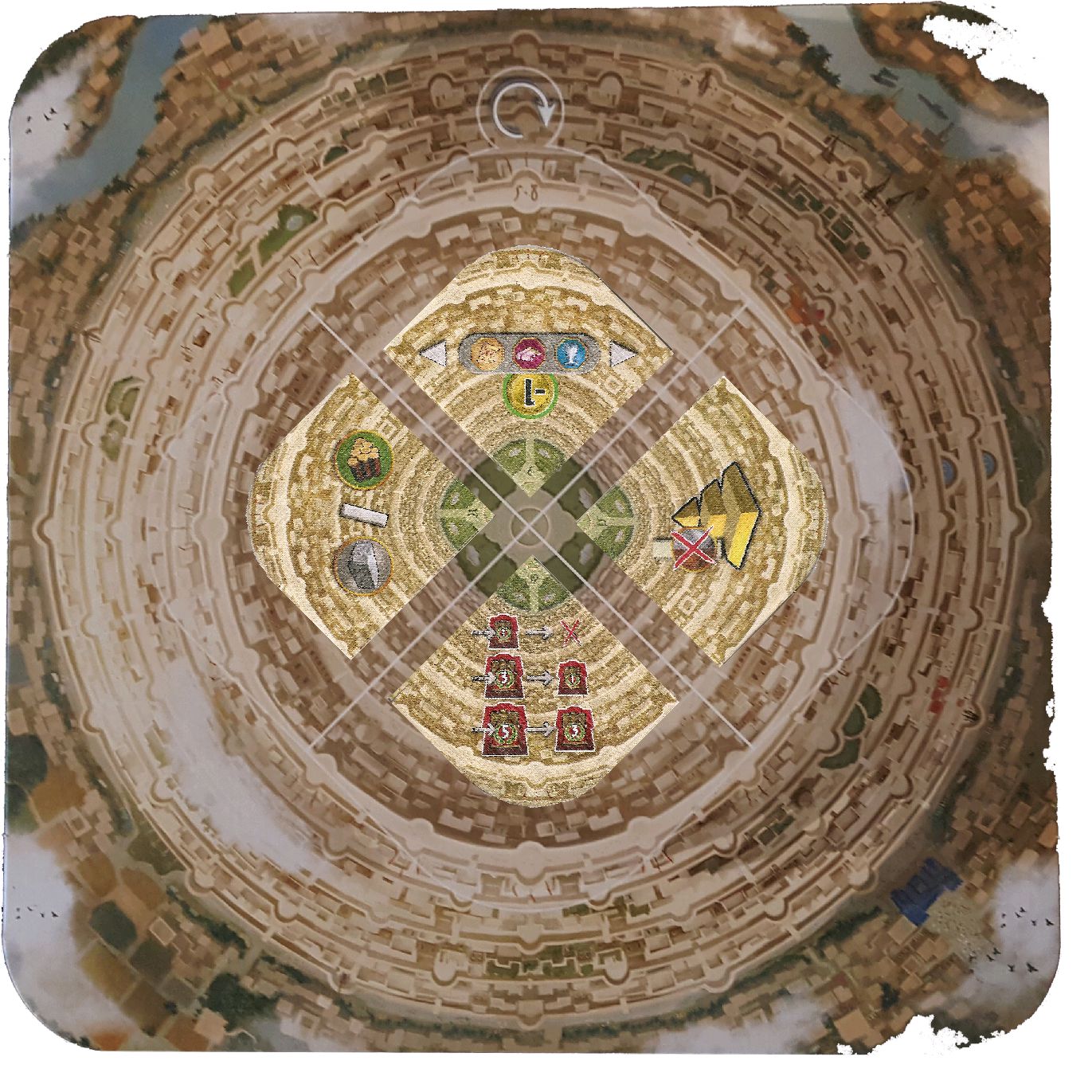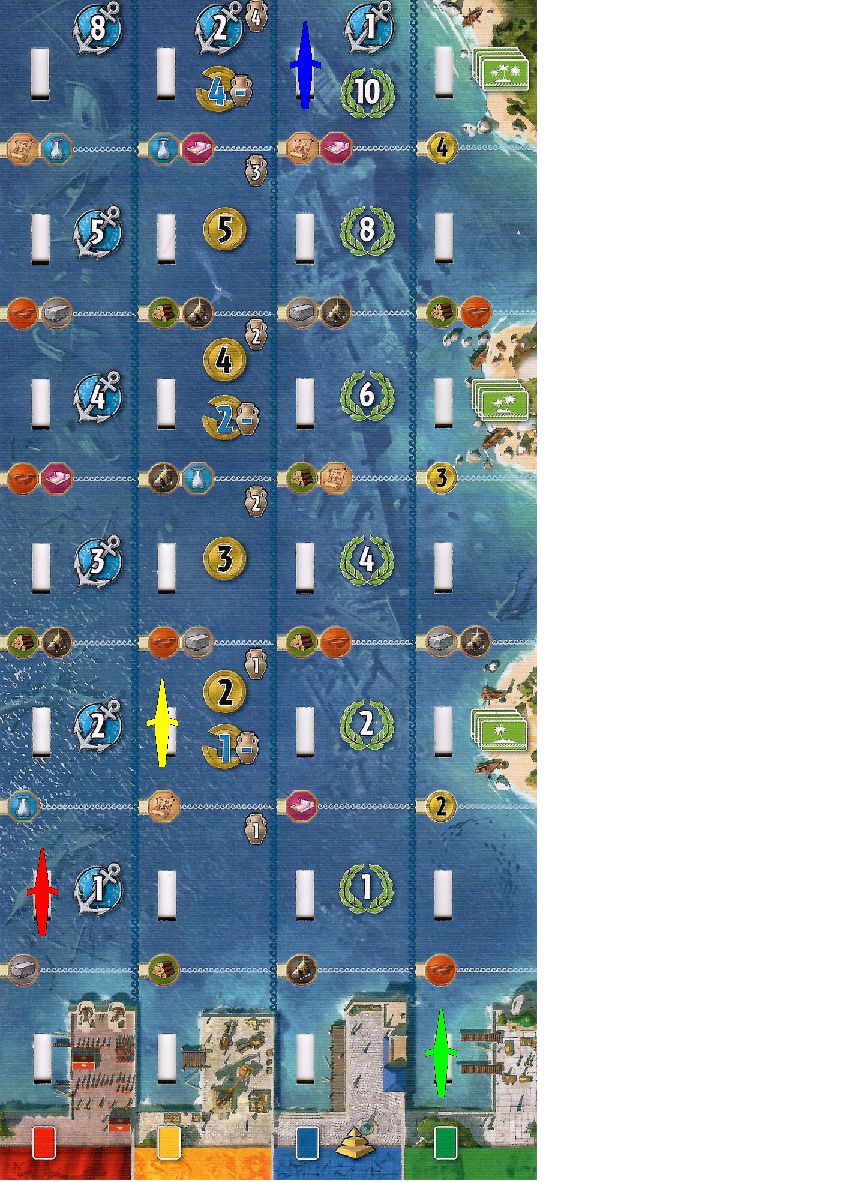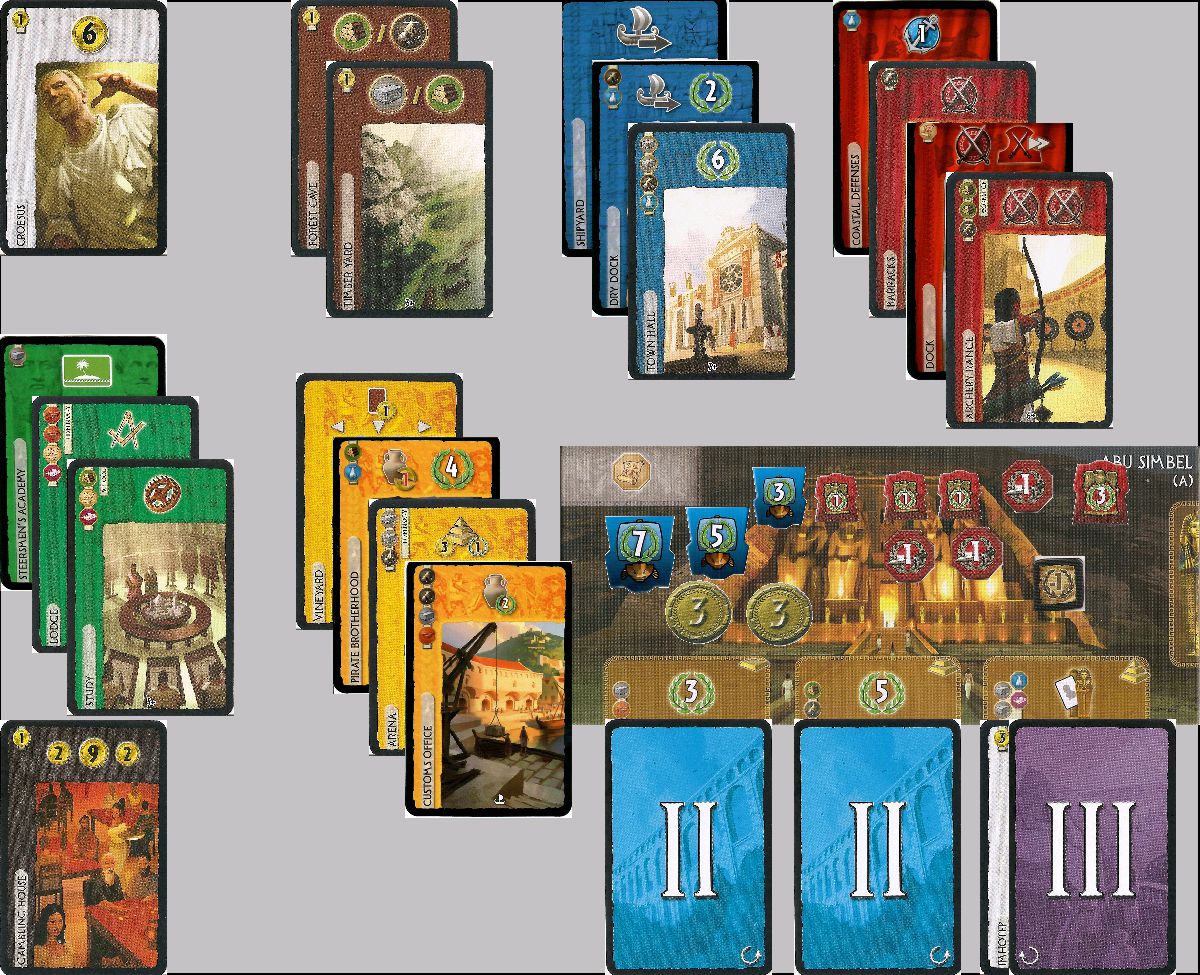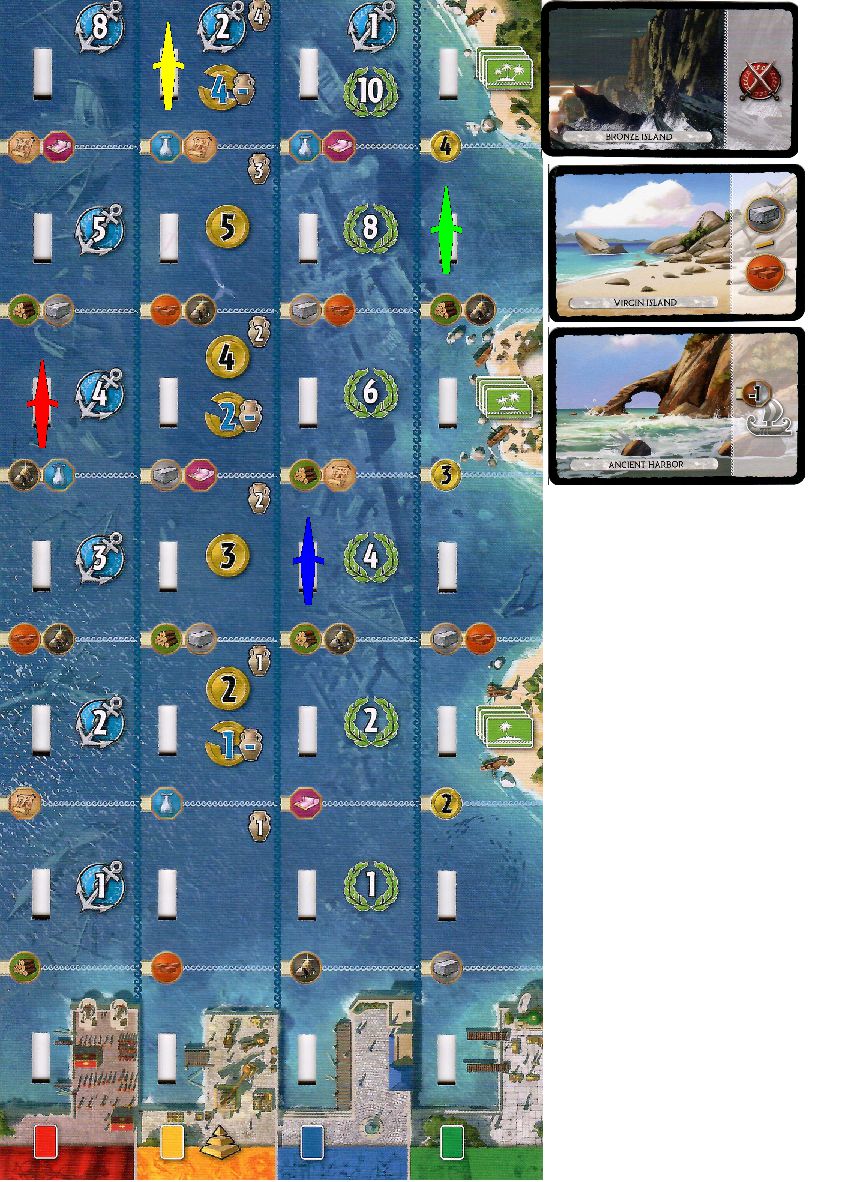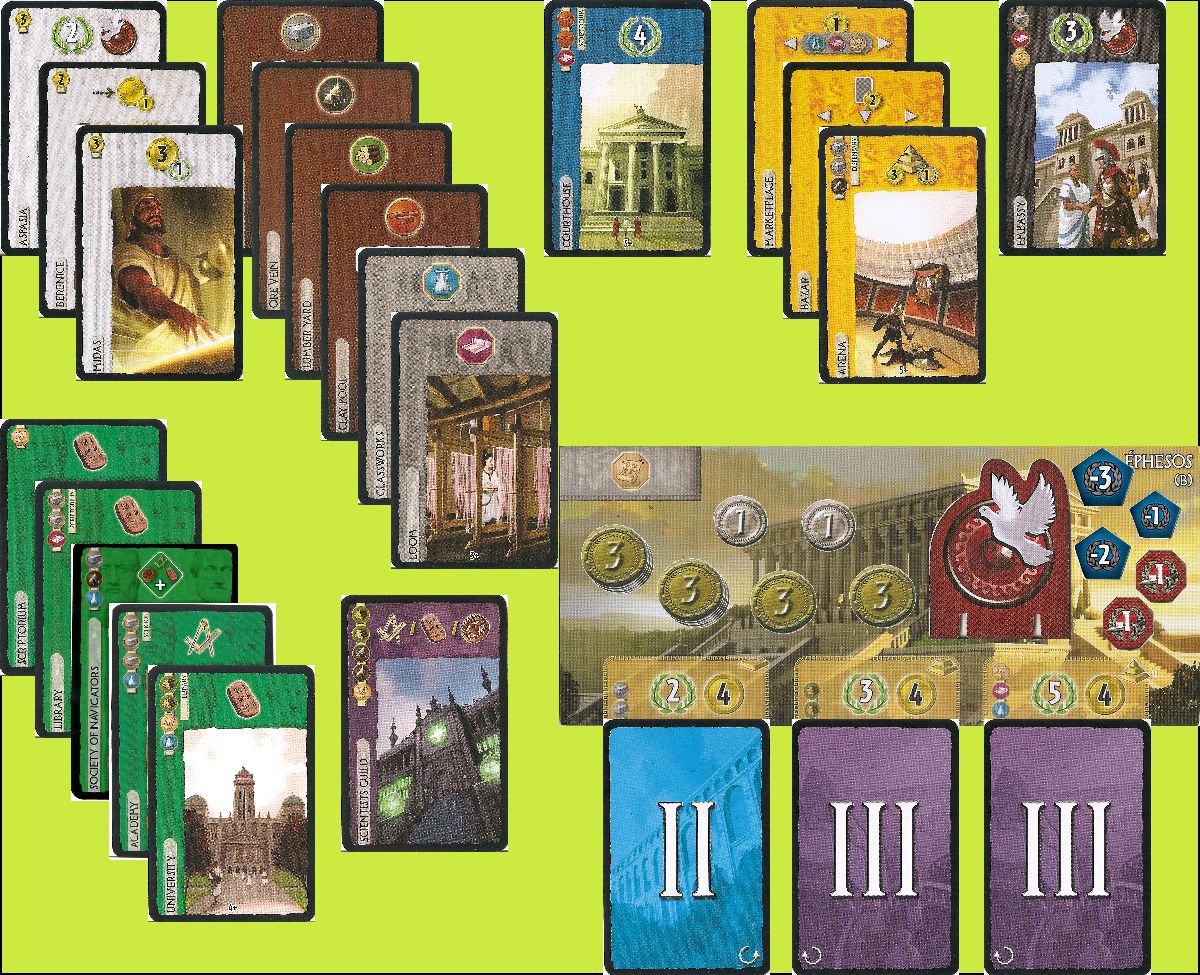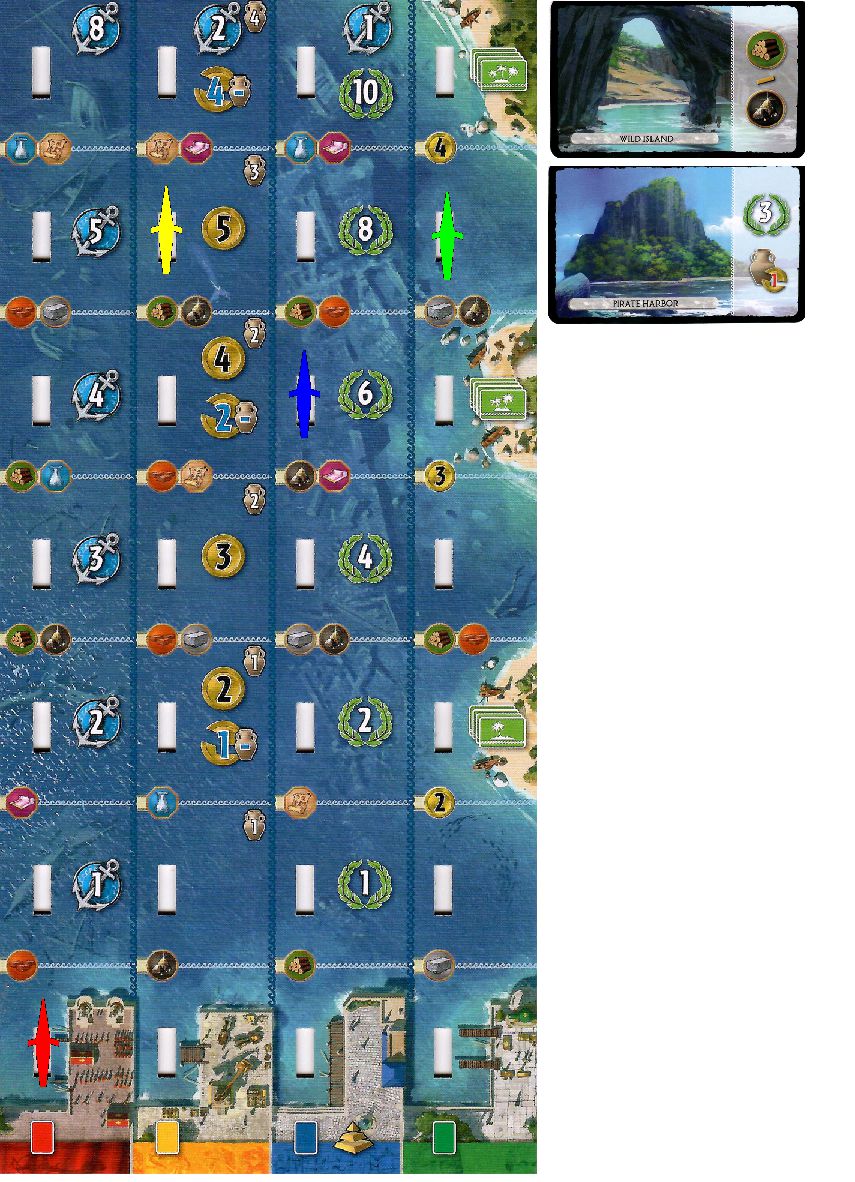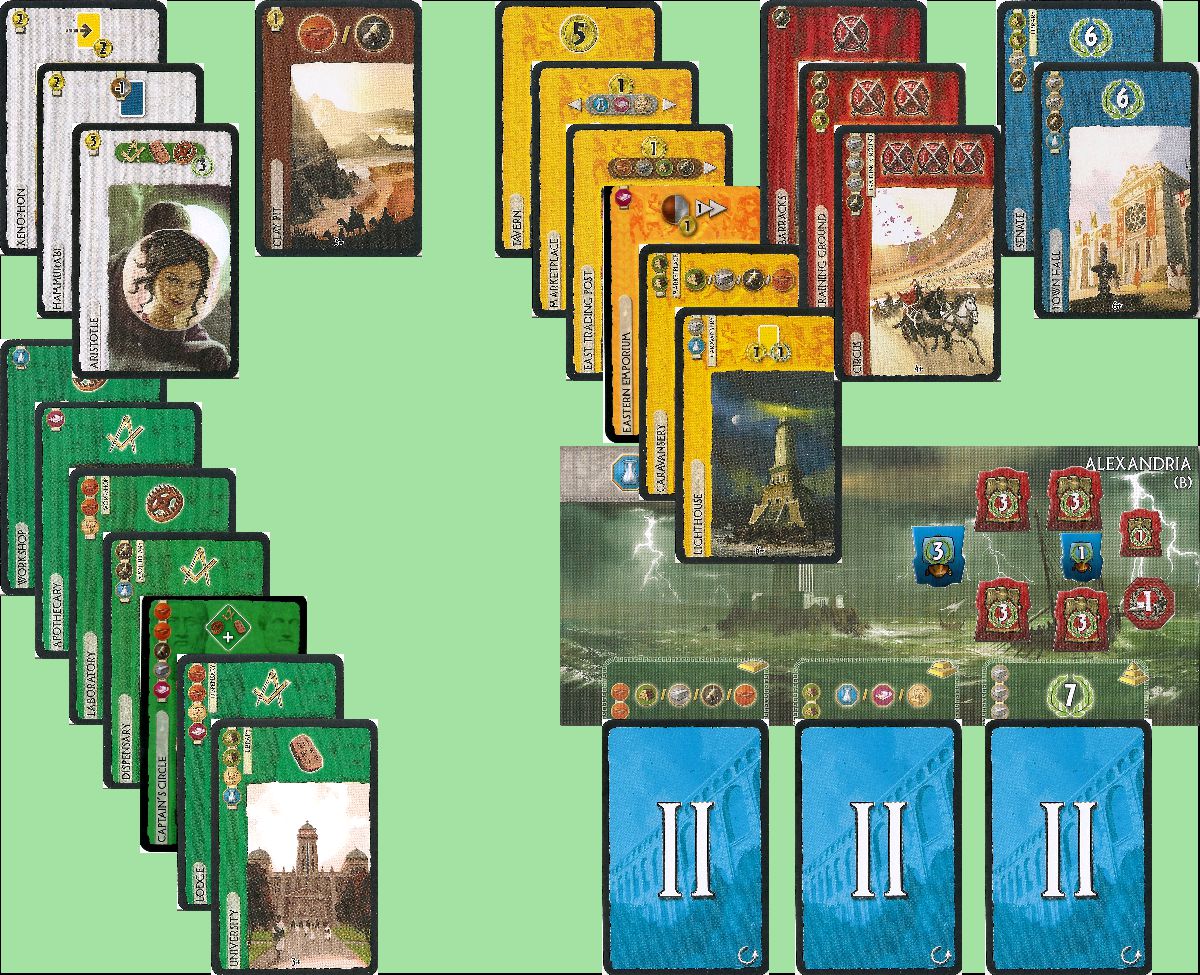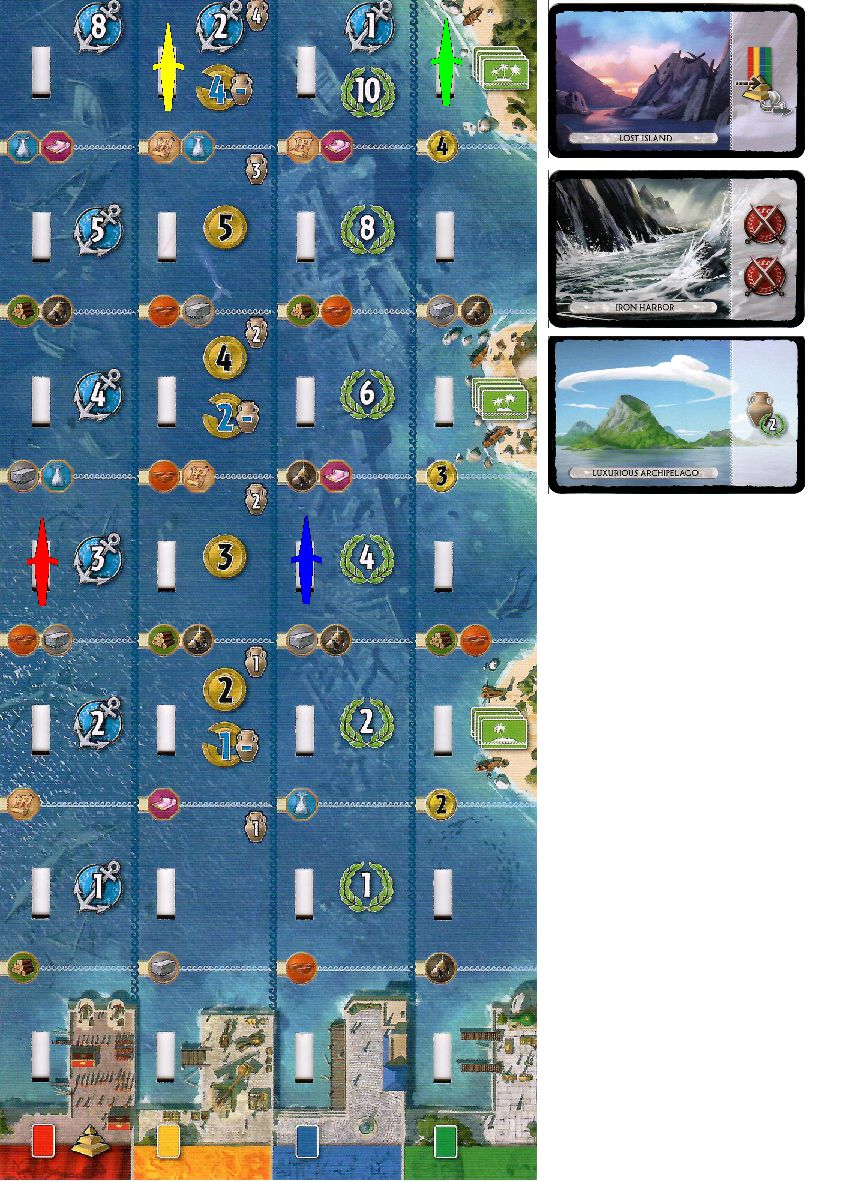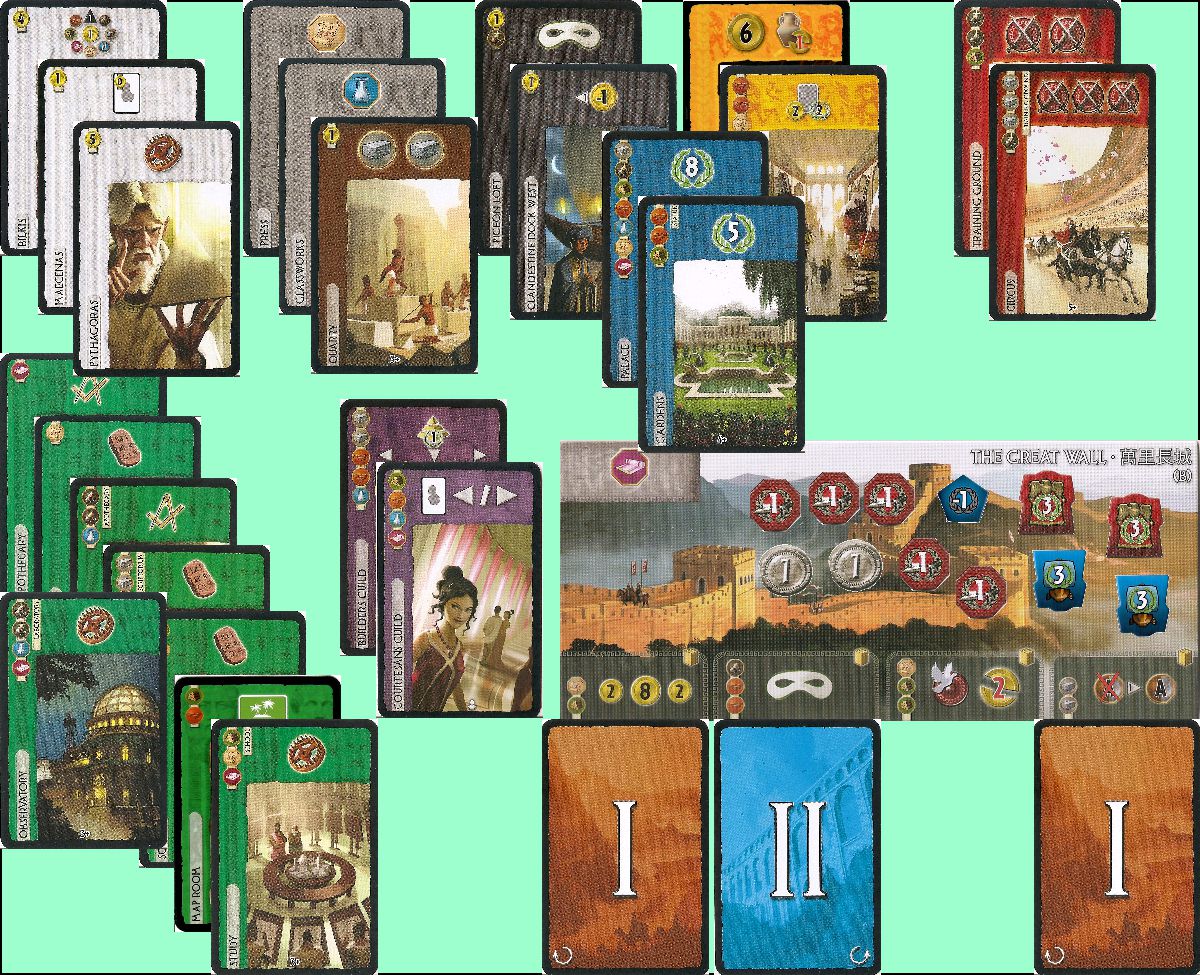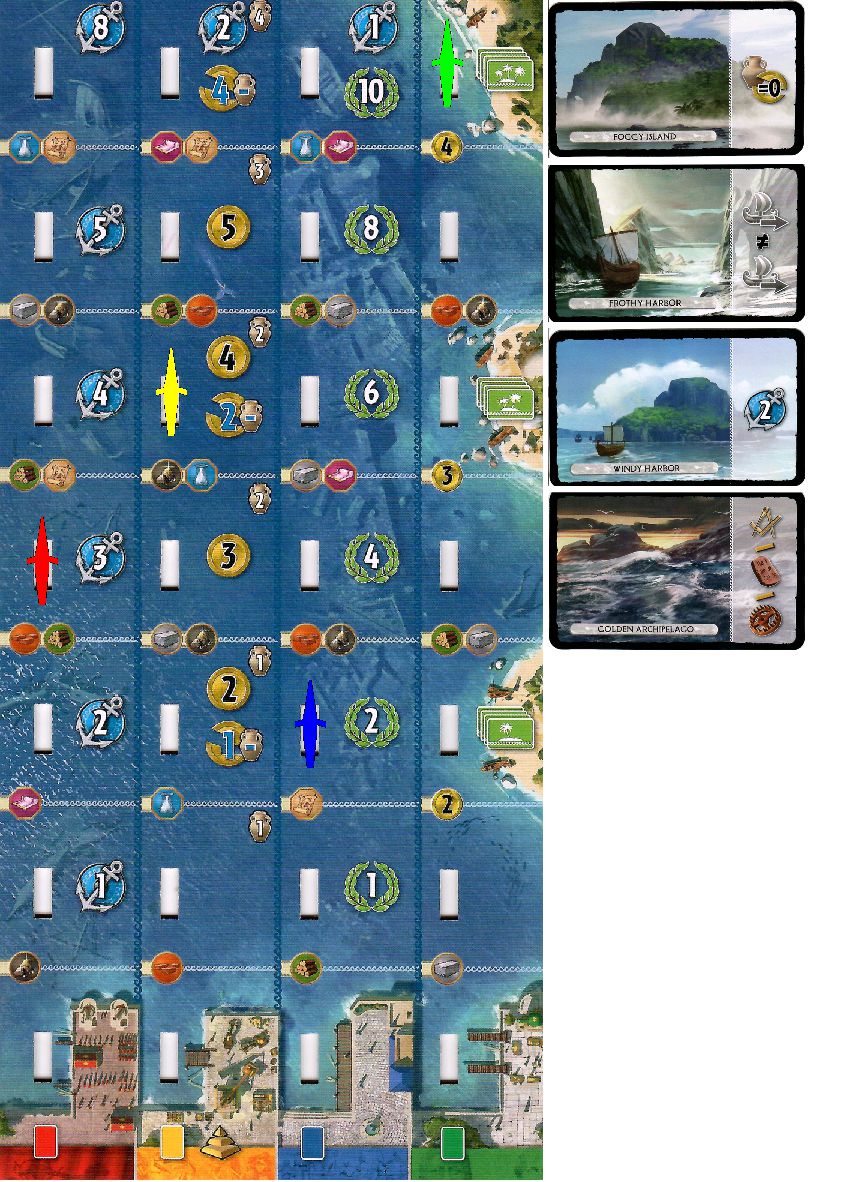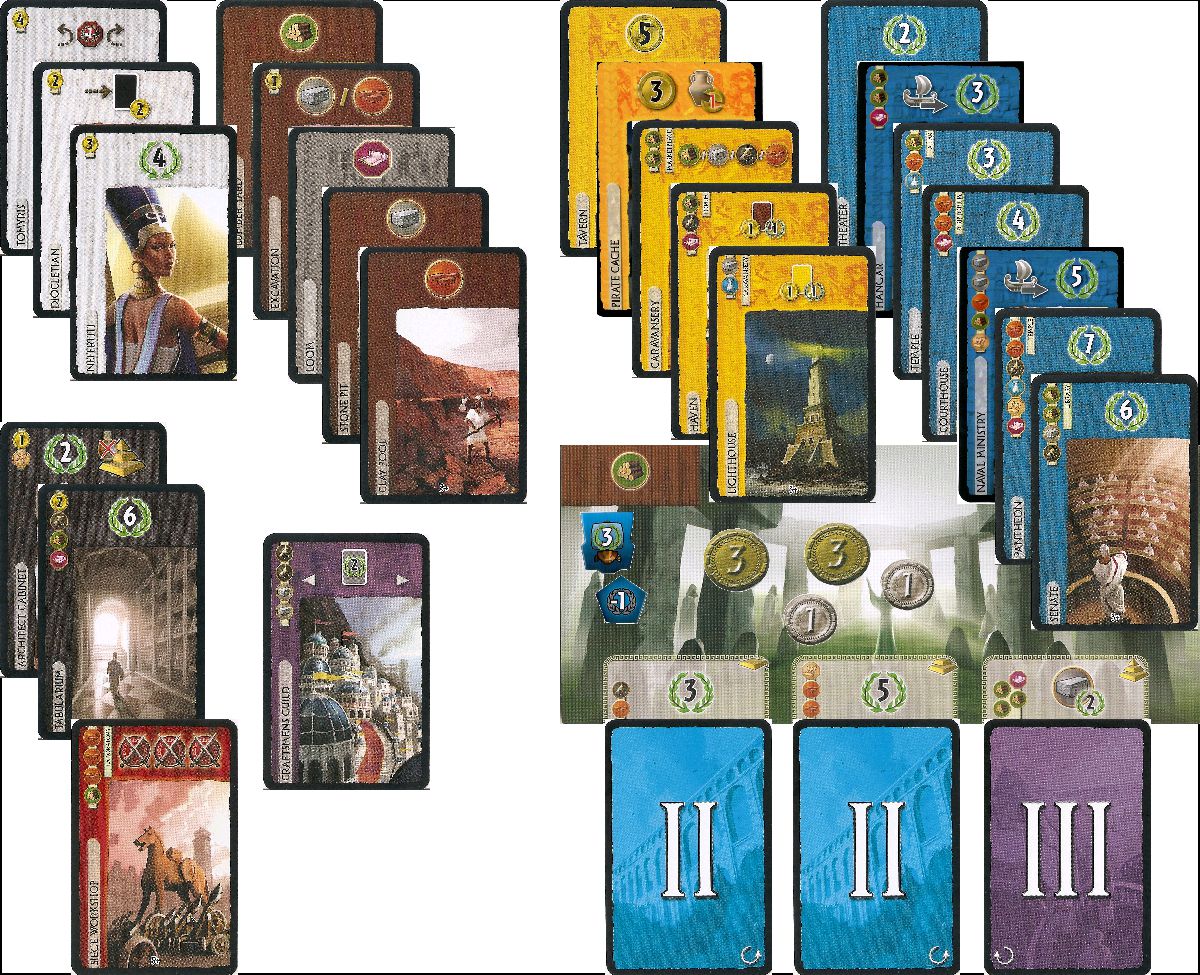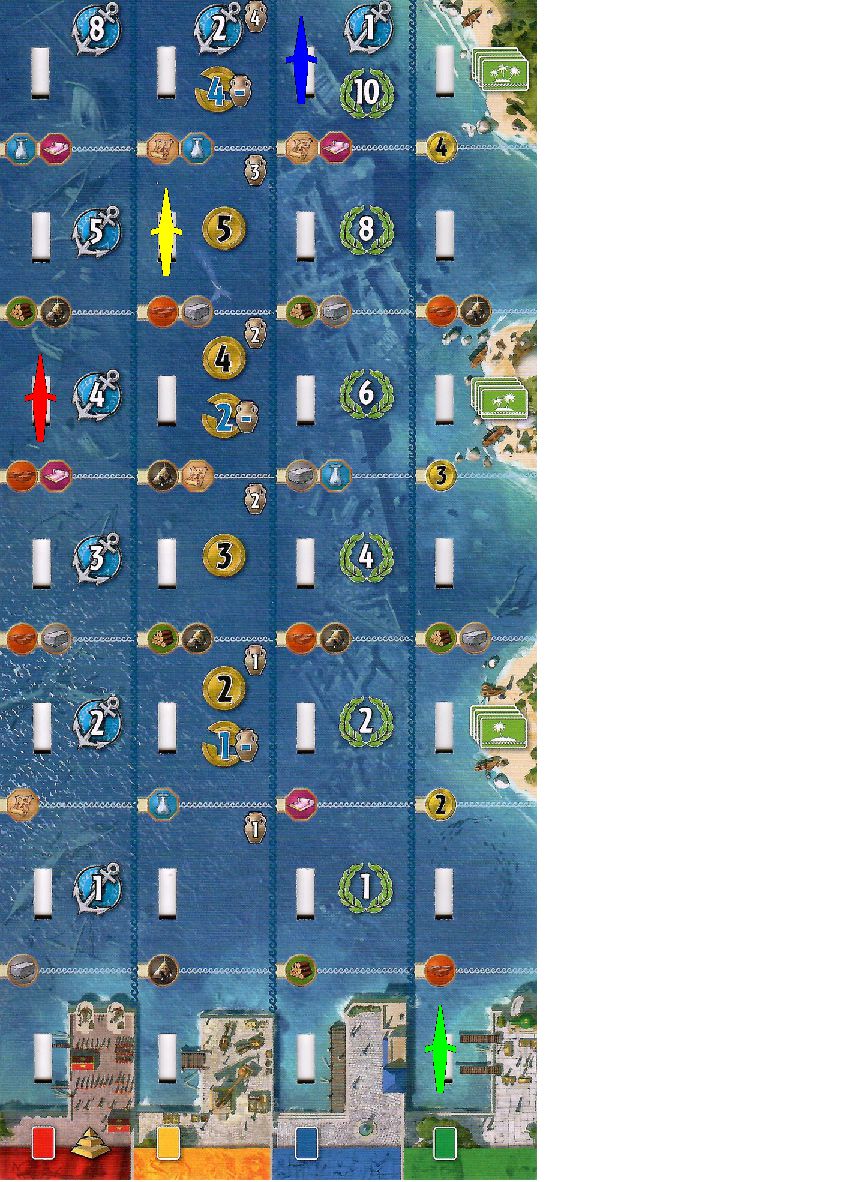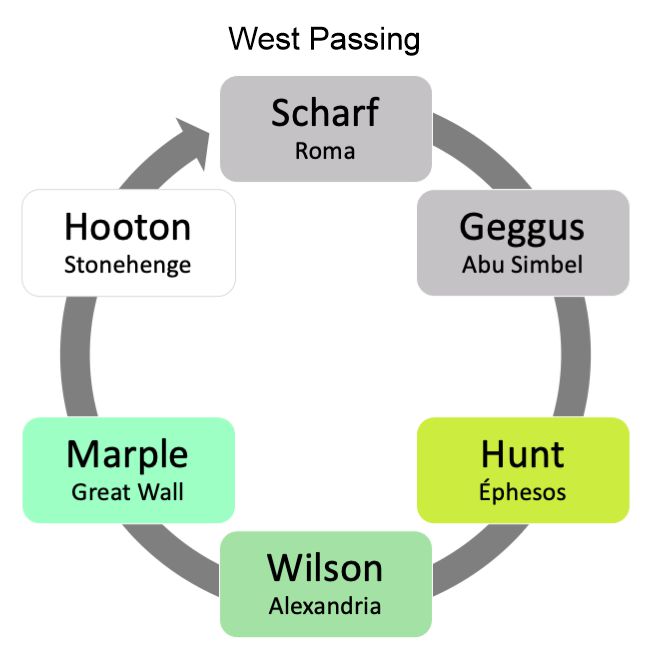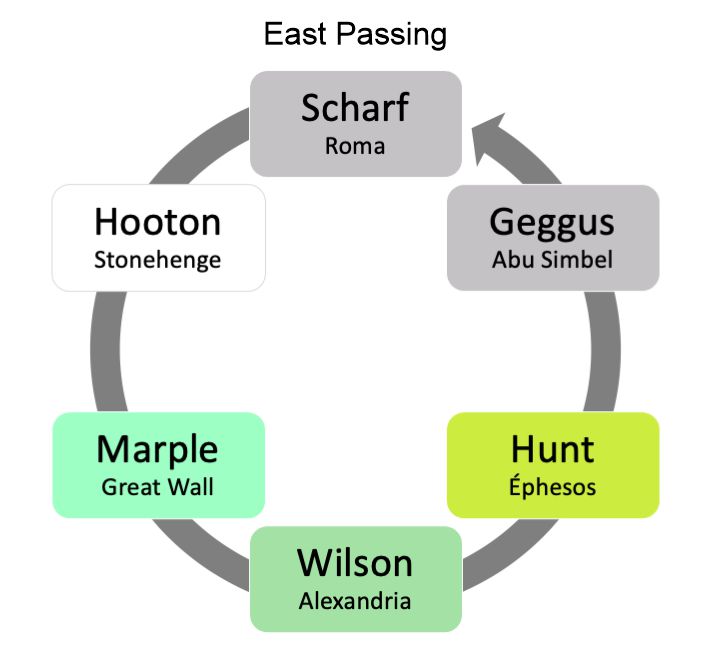Old English Sheepdog
7 Wonders -- Wonder Pack, Leaders, Cities, Armada,
Tower of Babel
Notes
Your Armada board will be to
the right (or below, depending on your screen resolution) of your
regular player board, and any islands you have will
be to the right of or below the Armada board. When you play a
card or
build a stage of your wonder, if you have the available resources, I
will automatically have you advance in the appropriate shipping
track. If you can get the resource from one of your neighbors,
you will have to specify that in your orders. Just for clarity
sake, I will be referring to the four shipping lanes as follows:
Red: Military, Yellow: Commercial; Blue: Civic; Green:
Exploration.
Age I
Rome spends 0 gold to recruit Darius.
Abu Simbel spends 1 gold to recruit Creosus, gaining 6 gold.
Ephesus spends 3 gold to recruit Aspasia, gaining a diplomacy marker.
Alexandria spends 2 gold to recruit Xerophon.
The Great Wall spends 4 gold to recruit Bilkis.
Stonehenge spends 4 gold to recruit Tomyris.
Rome spends 1 gold for a Mine.
Abu Simbel spends 1 gold for a Forest Cave.
Ephesus plays a Stone Pit.
Alexandria plays a Tavern, gaining 7 gold.
The Great Wall plays a Press.
Stonehenge plays a Lumber Yard.
Rome plays Glassworks.
Abu Simbel plays a Shipyard, advancing on the Exploration track, then spends 1 ore to advance on the Civics track.
Ephesus plays an Ore Vein.
Alexandria spends 1 glass for a Workshop.
The Great Wall pays 1 gold to Bilkis for lumber and spends 1 papyrus
and 1 lumber to build the first stage of its wonder, gaining 8
gold. Alexandria and Stonehenge each gain 2 gold.
Stonehenge pays 2 gold to Rome for ore, plays a Tavern, gaining 5 gold, and spends 1 ore to advance on the Commerce track.
Rome spends 1 gold for a Tree Yard.
Abu Simbel pays 2 gold to Ephesus for stone, spends stone for a
Steersman Academy, gaining Bronze Island, and spends 2 gold to advance
on the Exploration track, gaining Virgin Island.
Ephesus plays a Lumberyard.
Alexandria spends 1 gold for a Clay Pit.
The
Great Wall pays 1 gold to Bilkis for stone, spends 1 cloth to play an
Apothecary, and 1 stone to advance on the Exploration track.
Stonehenge plays a Theater and spends 1 lumber to advance on the Civics track.
Rome spends 2 gold for a Secret Warehouse.
Abu Simbel pays 2 gold to Rome for glass, spends glass for Coastal Defenses, and lumber to advance on the Military track.
Ephesus spends 1 papyrus for a Scriptorum and 1 stone to advance on the Exploration track.
Alexandria pays 2 gold to Ephesus for stone, plays
a Marketplace, gaining 2 gold, and spends 1 stone to advance on the
Commerce track.
The
Great Wall plays Glassworks.
Stonehenge spends 1 gold for an Excavation.
Rome plays a Loom.
Abu Simbel spends 1 ore for a Barracks and 1 papyrus to advance on the Military track.
Ephesus plays a Marketplace and spends 1 ore to advance on the Commerce track.
Alexandria pays 1 gold to The Great Wall for
cloth, spends 1 cloth for an Apothecary, and 1 ore to advance on the
Exploration track.
The
Great Wall pays 1 gold to Bilkis for stone, 2 gold to Stonehenge for
stone, 2 gold to Alexandria for brick, spends 2 stone to build the 4th
stage of its wonder, and 1 brick to advance on the Commerce track.
Stonehenge plays a Loom.
Rome plays a Theater and spends 1 ore to advance on the Civics track.
Abu Simbel spends 1 gold for a Timber Yard.
Ephesus discards a card to play Babel tile 3. Only brown cards
that produce a single item now produce anything at all.
Alexandria pays 1 gold to The Great Wall for
cloth, plays an East Trading Post, gaining 2 gold, and spends 1 cloth
to advance on the Commerce Track, gaining 2 gold. Rome and Abu
Simbel each lose 1 gold.
The
Great Wall spends 1 papyrus for a Scriptorum and 2 gold to advance on the Exploration track, gaining Foggy Island.
Stonehenge plays a Stone Pit.
Rome plays an Altar and spends 1 cloth to advance on the Civics track.
Abu Simbel pays 2 gold to Ephesus for ore, spends 1 papyrus for a Dock,
creating an incursion against Stonehenge, and spends 1 brick and 1 ore
to advance on the Military track.
Ephesus plays a Clay Pool.
Alexandria pays 1 gold to The Great Wall for
cloth, 2 gold to Ephesus for 1 ore and 1 lumber, spends 1 cloth for an
Eastern Emporium, gaining 2 gold, and spends 1 ore and 1 lumber to
advance on the Commerce track, gaining 3 gold.
The
Great Wall spends 1 gold and 1 ore for a Pigeon Loft.
Stonehenge pays 2 gold to The Great Wall for glass and plays Pirate
Cache, gaining 3 gold. Ephesus and Alexandria each lose 1
gold. Stonehenge then spends 1 glass to advance on the Commerce
Track, gaining 2 gold. Rome loses 1 gold and Abu Simbel gains 1 debt.
Rome pays 2 gold to Stonehenge for stone and spends 1 stone for Baths.
Abu Simbel discards a card to play Babel tile 11, giving all players a
1 gold discount on all basic resource trades with their neighbors.
Ephesus discards a card for 3 gold.
Alexandria pays 2 gold to Ephesus for 1 ore and 1
lumber, spends 1 ore for a Barracks, and 1 lumber to advance on the
Military track.
The
Great Wall spends 1 gold for a Clandestine Dock West.
Stonehenge plays a Clay Pool.
Ephesus does not take part in conflicts.
Rome has 0 shields, compared to 0 for Stonehenge and 3 for Abu Simbel, losing to Abu Simbel and tying Stonehenge.
Abu Simbel has 3 shields, compared to 0 for Rome and 1 for Alexandria, winning both.
Alexandria has 1 shield, compared to 3 for Abu Simbel
and 0 for The Great Wall, winning against The Great Wall and losing to Abu Simbel.
The Great Wall has 0 shields, compared to 1 for Alexandria and 0 for Stonehenge, losing to Alexandria and tying Stonehenge.
Stonehenge has 0 shields, compared to 0 for The Great Wall and 0 for Rome, tying both conflicts.
Abu Simbel versus Stonehenge. Abu Simbel has 3
shields to 0 for Stonehenge. Abu Simbel wins. Tomyris
reflects the loss marker back to Abu Simbel.
Abu Simbel has 4 naval shields, gaining 3VP.
Alexandria has 1 naval shield, gaining 1VP.
Rome, Ephesus, The Great Wall, and Stonehenge each have 0 naval shields, each gaining -1VP.
Age II
Rome spends 0 gold to recruit Varro.
Abu Simbel discards a leader for 3 gold.
Ephesus spends 2 gold to recruit Berenice.
Alexandria spends 2 gold to recruit Hammurabi.
The Great Wall spends 1 gold to recruit Maecenas.
Stonehenge spends 2 gold to recruit Diocletian.
Rome pays 1 gold to Stonehenge for lumber, plays a
Vineyard, gaining 8 gold, and spends 1 lumber to advance on the
Commerce track.
Abu Simbel spends 1 gold for a Gambling House, gaining 9 gold.
Rome and Ephesus each gain 2 gold. Ephesus gains another gold
from Berenice.
Ephesus plays a Library, which is free because of the Scriptorum, and
spends 2 gold to advance on the Exploration track, gaining Wild
Island.
Alexandria pays 1 gold to The Great Wall for
papyrus and 0 gold to Ephesus for brick, plays a Caravansery, which is
free because of the Marketplace, gains 2 gold, and spends 1 brick and 1
papyrus to advance on the Commerce track, gaining 4 gold. Abu
Simbel loses 2 gold, and Rome, Ephesus, and Stonehenge each lose 1 gold.
The Great Wall pays 1 gold to Bilkis for lumber, plays a Dispensary,
which is free because of the Apothecary, and spends 1 lumber and 1
stone to advance on the Exploration track.
Stonehenge spends 2 lumber for a Caravansery.
Rome plays a Press.
Abu Simbel plays a Vineyard, gaining 8 gold, and spends 1 brick to advance on the Commerce track.
Ephesus plays a Courthouse, which is free because of the Scriptorum, and spends 1 lumber to advance on the Civics track.
Alexandria plays a Laboratory, which is free
because of the Workshop, and spends 2 gold to advance on the
Exploration track, gaining Lost Island.
The Great Wall plays a Library, which is free because of the
Scriptorum, and spends 3 gold to advance on the Exploration track,
gaining Frothy Harbor, advancing on the Military and Commercial tracks, gaining 2 gold.
Stonehenge pays 2 gold to Rome for cloth, spends 2 lumber and 1 cloth
for a Hangar, advances on the Civics track, and spends 1 brick and 1
ore to advance again on the Civics track.
Rome pays 2 gold to Stonehenge for 1 brick and 1
lumber, plays an Aqueduct, which is free because of the Baths, and
spends 1 brick and 1 lumber to advance on the Civics track.
Abu Simbel pays 4 gold to Ephesus for 1 brick, 1 stone, and 1 glass,
spends 1 brick and 1 stone to build the first stage of its wonder, and
1 glass to advance on the Commerce track, gaining 2 gold.
Ephesus plays Glassworks.
Alexandria pays 1 gold to Ephesus for brick and
spends 2 brick to build the first stage of its wonder, advancing on the
Commerce track and gaining 5 gold.
The Great Wall pays 0 gold to Stonehenge for stone, plays a Pirate
Lair, gaining 6 gold, and spending 1 ore and 1 stone to advance on the
Commerce track, gaining 3 gold. Rome, Abu Simbel, Ephesus, and
Stonehenge each lose 1 gold. Alexandria loses 3 gold.
Stonehenge pays 2 gold to Rome for glass, 2 gold to The Great Wall for
glass, spends 1 glass, 1 brick, and 1 lumber for a Temple, and 1 glass
and 1 stone to advance on the Civics track.
Rome discards a card to play Babel tile 1. All red cards now cost an additional amount of gold equal to the current Age.
Abu Simbel pays 1 gold to Ephesus
for ore, and 4 gold to Rome for glass and cloth, spends 1 ore and 1
glass for a Dry Dock, advances on the Exploration track, and spends 1
cloth to advance on the Civics track.
Ephesus plays a Loom.
Alexandria pays 0 gold to Ephesus for lumber and 1
gold to The Great Wall for papyrus, spends 2 ore and 1 lumber for a
Training Ground, and 1 papyrus to advance on the Military track.
The Great Wall pays 0 gold to Stonehenge for lumber, 1 gold to Bilkis
for ore, spends lumber and papyrus for a School, and 1 brick and 1 ore
to advance on the Exploration track.
Stonehenge pays 2 gold to The Great Wall for papyrus, then spends 1
papyrus and 1 gold for an Architect's Cabinet, gaining 2 gold.
Rome spends 1 papyrus and 4 gold for Mercenaries.
Abu Simbel discards a card to play Babel tile 17. All players now have production of stone or lumber.
Ephesus plays a Bazaar, gaining 4 gold, then spends 1 glass to advance on the Commerce track, gaining 2 gold.
Alexandria pays 0 gold to Ephesus for lumber,
plays a Dispensary, which is free because of the Apothecary, and spends
1 lumber and 1 clay to advance on the Exploration track.
The Great Wall pays 0 gold to Stonehenge for lumber, spends lumber and brick for a Map Room, gaining Windy
Harbor, then spends 4 gold to advance on the Exploration Track, gaining Golden Archipelago.
Stonehenge spends 1 ore, 1 lumber, 1 cloth, and 2 gold for a Tabularium, gaining 2 gold.
Rome pays 1 gold to Stonehenge for lumber,
plays a Temple, which is free because of the Altar, and spends 1 lumber
and 1 papyrus to advance on the Civics track.
Abu
Simbel pays 2 gold to Ephesus for lumber and ore, spends ore and lumber
to build the second stage of its wonder, and lumber and stone to
advance on the Commerce track, gaining 3 gold.
Ephesus spends stone, ore, and glass for the Society of Navigators, and lumber and brick to advance on the Exploration track.
Alexandria spends 2 lumber to build the second stage of its wonder, advancing on the Exploration track and gaining Iron Harbor.
The Great Wall pays 1 gold to Bilkis for ore, 0 gold to Stonehenge for
brick, and spends 1 ore and 2 brick to build the second stage of its
wonder.
Stonehenge builds the first stage of its wonder, and stone to advance on the Military track.
Rome discards a card to play Babel tile 15,
allowing all players to ignore the resource cost of building a stage of
their wonders. The trading discount is discontinued.
Abu
Simbel discards a card to advance on the Commerce track, gaining 4 gold. Rome and Stonehenge each lose 1 gold.
Ephesus discards a card to advance on the Commerce track, gaining 3 gold plus 1 for Berenice.
Alexandria discards a card to put Babel tile 9
into play. There is a 1 gold discount on all trades for cloth,
glass, and papyrus, and all brown cards are now fully functional.
The Great Wall pays 0 gold to Stonehenge for lumber, 1 gold to Bilkis
for ore, spends 2 ore, 1 lumber, and 2 gold for a Training Ground, and
1 cloth to advance on the Military track.
Stonehenge spends 2 brick and 1 cloth for a Courthouse, and 1 lumber and 1 stone to advance on the Civics track.
Rome pays 2 gold to Stonehenge for stone,
spends 1 ore, 1 brick, 1 lumber, and 2 gold for Stables, and 1 stone to
advance on the Military track.
Abu
Simbel pays 3 gold to Rome for ore and glass, spends 2 lumber, 1 ore,
and 2 gold for an Archery Range, and 1 ore and 1 glass to advance on
the Military track.
Ephesus builds the first stage of its wonder, gaining 4 gold plus 1 for
Berenice, and spends 1 papyrus to advance on the Civics track.
Alexandria builds the final stage of its wonder and advances on the Civic track.
The Great Wall spends 1 gold for a Quarry.
Stonehenge pays 1 gold to Rome for papyrus, builds the second stage of
its wonder, and spends 1 papyrus to advance on the Military track.
Rome has 5 shields, compared to 0 for Stonehenge and 5 for Abu Simbel, tying to Abu Simbel and winning against Stonehenge.
Abu Simbel has 5 shields, compared to 5 for Rome and 0 for Ephesus, tying Rome and winning against Ephesus.
Ephesus has 0 shields, compared to 5 for Abu Simbel and 5 for Alexandria, losing both conflicts.
Alexandria has 5 shields, compared to 0 for Ephesus
and 2 for The Great Wall, winning both conflicts.
The Great Wall has 2 shields, compared to 4 for
Alexandria and 0 for Stonehenge, losing to Alexandria and winning
against Stonehenge.
Stonehenge has 0 shields, compared to 2 for The Great
Wall and 5 for Rome, losing both conflicts. Tomyris reflects the
loss tokens back to the victors.
Abu Simbel has 5 naval shields, gaining 5VP.
The Great Wall has 4 naval shields, gaining 3VP.
Alexandria and Stonehenge each have 2 naval shields, gaining 0VP.
Rome has 1 naval shield, gaining 0VP.
Ephesus has 0 naval shields, each gaining -2VP.
Age III
Rome spends 0 gold to recruit Hiram.
Abu Simbel spends 3 gold to recruit Imhotep.
Ephesus spends 3 gold to recruit Midas.
Alexandria spends 3 gold to recruit Aristotle.
The Great Wall spends 0 gold to recruit Pythagoras.
Stonehenge spends 3 gold to recruit Nefertiti.
Rome plays a Pantheon, which is free because of the Temple, then spends ore and stone to advance on the Civics track.
Abu Simbel pays 1 gold to Rome for glass, spends lumber and glass for a
Pirate Brotherhood, and brick and ore to advance on the Commerce track,
gaining 5 gold. Rome loses 1 gold. Ephesus and Stonehenge each
lose 2 gold. Alexandria loses 3 gold.
Ephesus spends 2 brick and 1 ore for a Forum, gaining 3 gold plus 1
gold for Berenice, then spends brick and papyrus to advance on
the Commerce track, gaining 4 gold. Rome loses 1 gold.
Alexandria spends 2 lumber, 1 stone, and 1 ore for a Senate and 1 glass to advance on the Civics track.
The Great Wall plays a Study, which is free because of the School.
Stonehenge pays 2 gold to Rome for ore, spends lumber, ore, and cloth
for a Haven, gaining 4 gold, and ore and lumber to advance on the
Commerce track, gaining 3 gold.
Rome spends papyrus, cloth, and glass for a Traders' Guild.
Abu
Simbel pays 3 gold to Rome for cloth and brick, spends 2 brick,
papyrus, and cloth for a Lodge, and 3 gold to advance on the
Exploration track, gaining Ancient Harbor.
Ephesus pays 2 gold to Abu Simbel for ore and spends 2 lumber, 2 ore, and papyrus for a Scientists' Guild.
Alexandria pays 2 gold to Ephesus for stone and
ore, spends 2 brick, ore, stone, and cloth for a Captain's
Circle, and stone and ore to advance on the Exploration track.
The Great Wall pays 1 gold to Bilkis for brick and spends 2 stone, 2 brick, and 1 glass for a Builders' Guild.
Stonehenge pays 1 gold each to Rome and The Great Wall for papyrus from
each, spends 2 stone, brick, lumbrer, and papyrus for a Naval Ministry,
advancing on the Commerce track, gaining 4 gold, and spends papyrus and
cloth to advance on the Civics track. Rome loses 1 gold.
Rome spends 5 gold and 1 cloth for a Contingent.
Abu
Simbel pays 1 gold to Rome for cloth, spends lumber, cloth, and papyrus
for a Study, and ore to advance on the Exploration track.
Ephesus pays 2 gold to Abu Simbel for stone and spends 3 stone and 1
glass for an Academy, and spends 3 gold to advance on the Exploration
track, gaining Pirate Harbor. Rome loses 1 gold, Stonehenge loses
2 gold, and Abu Simbel and Alexandria each lose 3 gold.
Alexandria plays a Lodge, which is free because of
the Dispensary, and spends 4 gold to advance on the Exploration track,
gaining Luxurious Archipelago.
The Great Wall spends lumber, brick, cloth, and glass for a Courtesans' Guild, copying Aristotle.
Stonehenge pays 2 gold to Rome for ore and spends 2 stone and 2 ore for a Craftsmens' Guild.
Rome pays 1 gold to Abu Simbel for papyrus, spends
2 brick and 1 papyrus for a Chamber of Commerce, gaining 6 gold, and 1
papyrus to advance on the Commerce track, gaining 2 gold.
Abu
Simbel pays 1 gold to Rome for glass, spends 2 stone, 1 ore, and 1
glass for a Town Hall, then spends 1 lumber to advance on the Civics
track.
Ephesus plays a University, which is free because of the Library, and spends ore and stone to advance on the Exploration track.
Alexandria plays a Lighthouse, which is free
because of the Caravansery, gains 6 gold, and spends glass and papyrus
to advance on the Commerce track. Rome loses 3 gold, Ephesus and
Stonehenge each lose 2 gold, and Abu Simbel loses 1 gold.
The Great Wall pays 1 gold to Bilkis for ore and spends 2 ore, 1 glass, and 1 cloth for an Observatory.
Stonehenge plays a Pantheon, which is free because of the Temple.
Rome spends stone, lumber, papyrus, and glass for a Diplomat's Guild.
Abu
Simbel pays 1 gold to Rome for glass, spends 2 stone and 1 glass to
build the final stage of its wonder, entombing Imhotep, and spends 1
papyrus to advance on the Commerce track. Rome loses 3 gold,
Ephesus and Stonehenge each lose 2 gold.
Ephesus spends stone, cloth, and papyrus for an Embassy, gaining a Diplomacy token.
Alexandria spends stone, ore, and glass for a Town Hall, and stone and ore to advance on the Civics track.
The Great Wall pays 1 gold to
Stonehenge for brick, 1 gold to Bilkis for lumber, spends lumber, ore,
brick, stone, papyrus, cloth, and glass for a Palace, and lumber to
advance on the Civics track.
Stonehenge spends 2 lumber, 1 stone, and 1 ore for a Senate.
Rome spends 2 brick, 1 stone, 1 cloth, and 1 glass
for a Cenotaph. Abu Simbel loses 4 gold, Alexandria loses 3 gold,
and The Great Wall loses 1 gold.
Abu
Simbel spends 2 stone and 1 ore for an Arena, gaining 9 gold.
Ephesus builds the second stage of its wonder, gaining 4 gold plus 1
for Berenice, then spends stone and ore to advance on the Civics track.
Alexandria spends 2 lumber, papyrus, and glass for a University.
The Great Wall pays 1 gold
to Bilkis for brick, spends 2 brick and 1 lumber for Gardens, and 1
papyrus to advance on the Civics track.
Stonehenge plays a Lighthouse, which is free because of the
Caravansery, gaining 5 gold, then spends brick and stone to advance on
the Commerce track, gaining 5 gold.
Rome spends 2 lumber, 1 ore, and 1 cloth for a
Brotherhood. Abu Simbel, Ephesus, Alexandria, The Great Wall, and Stonehenge each lose 3
gold.
Abu
Simbel pays 2 gold to Rome for ore and spends 2 ore, 1 stone, and 1 brick for a Customs Office.
Ephesus builds the third stage of its wonder and spends ore and cloth to advance on the Civics track.
Alexandria plays a Circus, which is free because of the Training Ground, and 1 brick and
1 stone to advance on the Military track.
The
Great Wall pays 1 gold to Stonehenge for brick, 1 gold to Bilkis for
ore, spends 2 brick and 1 papyrus for a Chamber of Commerce, gaining 4
gold, and 1 ore and 1 glass to advance on the Commerce track, gaining 4
gold.
Stonehenge builds the third stage of its wonder and spends brick and stone to advance on the Military track.
Rome builds the first stage of its wonder and spends papyrus and cloth to advance on the Civics track.
Abu
Simbel discards a card to play Babel tile 19. All land victory tokens earned are reduced 1 step.
Ephesus discards a card to advance on the Explroation track, gaining 5 gold plus 1 for Berenice.
Alexandria discards a card to play Babel tile 10.
The Great Wall plays a Circus, which is free because of the Training
Ground but costs 3 gold because of the Babel tile, and spends lumber
and brick to advance on the Military track.
Stonehenge pays 2 gold to Rome for brick, spends 3 brick and 1 lumber
for a Siege Workshop, and 1 brick and 1 cloth to advance on the
Military track.
Ephesus does not participate in land conflict.
Rome has 10 shields, compared to 0 for Stonehenge and 5 for Abu Simbel, winning both conflicts.
Abu Simbel has 5 shields, compared to 10 for Rome and 8 for Alexandria, losing both conflicts.
Alexandria has 8 shields, compared to 5 for Abu Simbel
and 5 for The Great Wall, winning both conflicts.
The Great Wall has 5 shields, compared to 8 for
Alexandria and 3 for Stonehenge, losing to Alexandria and winning
against Stonehenge.
Stonehenge has 3 shields, compared to 5 for The Great
Wall and 10 for Rome, losing both conflicts. Tomyris reflects the
loss tokens back to the victors.
Abu Simbel has 7 naval shields, gaining 7VP.
Alexandria, The Great Wall, and Stonehenge each have has 5 naval shields, gaining 3VP.
Rome has 2 naval shield, gaining 0VP.
Ephesus has 0 naval shields, each gaining -3VP.
Rome gains 9 points from the Traders' Guild and 4 points from the Diplomats' Guild.
The Great Wall gains 9 points from the Builders' Guild and 9 points from the Courtesans' Guild.
Stonehenge gains 10 from the Craftsmens' Guild.
|
|
Rome
|
Alexandria
|
The Great Wall
|
Stonehenge
|
|
Conflicts
|
2
|
18
|
-8
|
16
|
6
|
2
|
|
Cash
|
5
|
1
|
14
|
0
|
0
|
2
|
|
Wonder
|
4
|
14
|
10
|
7
|
0
|
12
|
|
Civics
|
22
|
8
|
4
|
12
|
13
|
30
|
|
Commercial
|
6
|
15
|
3
|
6
|
4
|
9
|
|
Science
|
0
|
2
|
26
|
28
|
64
|
0
|
|
Guilds
|
13
|
0
|
0
|
0
|
18
|
10
|
Boats
|
10
|
4
|
6
|
4
|
2
|
10
|
Islands
|
0
|
0
|
3
|
8
|
0
|
0
|
|
Cities
|
9
|
0
|
3
|
0
|
0
|
8
|
|
Leaders
|
11
|
0
|
16
|
3
|
0
|
4
|
Tower
|
5
|
10
|
2
|
5
|
0
|
0
|
|
Total
|
87
|
72
|
79
|
89
|
107
|
87
|
Congratulations to Keith on his victory!
Chris Geggus (Abu Simbel):
Ouch - not even close. Well done to Keith who scored two thirds of his
points from Science. I really must learn to keep those and not go
frittering my actions away on pretty ships or humerous clandestine
activities. And maybe a guild or two might help my score. Thanks to
all, including Chris H. - always fun.
Christopher Hunt (Ephesus):
Congrautins to Keith on his decisive win. Thanks to Chris H
for working out the maths and records keeping. Tried a bit
of different things always a bad sign. A dramatic naval
disaster. Liked Babel a lot hore to play more.
Bill Sharf (Rome):
Congratulations to Keith on his win, and thanks Chris for running it.
Science can be a great way to victory, but you have to go all in on it,
four or five green cards aren’t going to be near enough, so I typically
go big on green or avoid them entirely. If you have leaders or a wonder
board that adds symbols, so much the better.
Keith Marple (The Great Wall):
Great game, I enjoyed the extra factor of Babel to consider. This
game I felt that my wonder board was almost overpowered for a science
game, with an immediate paper, cash and free resources every round via
my wonder, and an extra science symbol too, it felt like I had
tailwinds all game. Thanks all for playing and I look forward to
the next one.
Dave Hooton (Stonehenge):
Congratulations to Keith of his blowout victory. I don't think I've
ever seen so many science points. The first Babel tile really limited
my options for awhile and I finished in the middle of the pack. Thanks,
Chris, for running this.
Kevin Wilson (Alexandria):
I started looking for science cards too and did get a few early but
they dried up because Keith was hogging them all. I probably should
have switched to civic cards but those too seemed few and far between.
I had plenty of coin early and only a couple of times did I need to
play to gain some and at least one of those had to pass on a civic
card. But, I did get lucky with some that gave VP for trade cards so
get a few there. One or two more science and it could have been
different. Military seemed to go OK too. I probably should have tried
for a Guild late since I wasn’t seeing many civic or science cards but
the only two I recall seeing didn’t provide much.
I seem to be the odd one out as I didn’t feel Babel added much. In
fact, I kind of have that view about Leaders too. Neither seem to add a
whole lot to me. Cities I do like as well as Armada but the other two I
can take them or not.
Congrats to Keith. Intercepting those science cards paid off. Thanks to
the others for the play and, as always, to Chris for running the game.
I suspect Christopher has it right, for Chris the hardest part is the
tabulating at the end. Passing and recording cards goes well.
The Players
|
|
|
|
| Bill Scharf |
Rome A
|
16
| 1
|
| Chris Geggus |
Abu Simbel A
|
6
| 0
|
| Christopher Hunt |
Ephesus B
|
44
| 1
|
| Kevin Wilson |
Alexandria B
|
3
| 2
|
| Keith Marple |
The Great Wall B
|
2
| 3
|
Dave Hooton
|
Stonehenge A
|
8
| 3
|
Clockwise (west) passing will go down this list, while
counterlockwise (east)
passing will go up.
